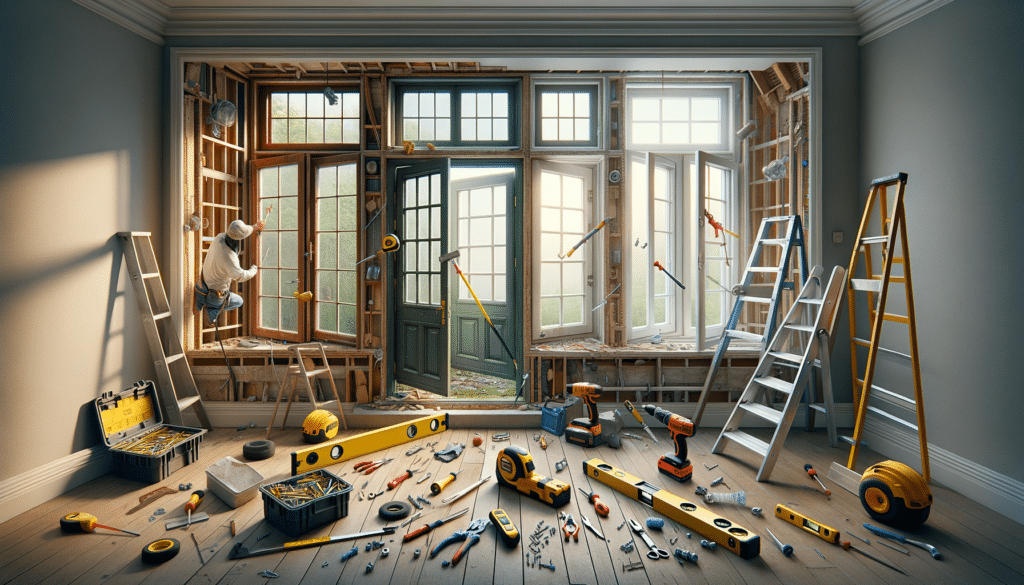Understanding the Importance of Window Replacement
Windows serve as the eyes of your home, providing light, ventilation, and a view of the outside world. However, as they age, windows can become less efficient, leading to increased energy bills and diminished comfort. Replacing windows not only enhances the aesthetic appeal of your home but also significantly improves energy efficiency. Modern windows are designed with advanced materials and technologies that provide superior insulation, helping to maintain a consistent indoor temperature. This can lead to substantial savings on heating and cooling costs. Additionally, new windows can reduce noise pollution, enhance security, and increase the overall value of your property.
Types of Windows: Choosing the Right Fit
When considering window replacement, it’s essential to choose the right type of window that suits your needs and complements the architectural style of your home. There are several types of windows available, each with unique features and benefits:
- Double-Hung Windows: These are among the most popular options, known for their versatility and ease of use. They feature two sashes that slide vertically, allowing for excellent ventilation.
- Casement Windows: Hinged at the side, these windows open outward like a door, providing unobstructed views and superior ventilation.
- Bay and Bow Windows: Ideal for creating a focal point in a room, these windows extend outward, offering panoramic views and additional interior space.
- Slider Windows: These windows slide horizontally and are perfect for spaces where vertical space is limited.
Each type has its own set of advantages, and the choice largely depends on your specific needs, budget, and aesthetic preferences.
Materials Matter: Selecting the Right Window Frame
The material of the window frame plays a crucial role in the window’s performance, durability, and maintenance requirements. Here are some common materials used in window frames:
- Vinyl: Known for its affordability and energy efficiency, vinyl is a popular choice for many homeowners. It requires minimal maintenance and offers excellent insulation.
- Wood: Offering a classic and timeless appeal, wood frames are highly customizable and provide good insulation. However, they require regular maintenance to prevent rot and weather damage.
- Aluminum: Durable and lightweight, aluminum frames are ideal for modern designs. They are less insulating than other materials but can be improved with thermal breaks.
- Fiberglass: This material combines strength and energy efficiency, offering a low-maintenance option that mimics the appearance of wood.
The choice of material will affect the overall cost, appearance, and performance of your new windows, so it’s essential to weigh the pros and cons carefully.
Installation Process: What to Expect
The installation process is a critical phase in window replacement, as improper installation can negate the benefits of new windows. Here’s what you can typically expect during the installation process:
- Assessment: A professional will assess your current windows and take precise measurements to ensure a perfect fit for the replacements.
- Preparation: The area around the windows will be prepared, which may involve removing window treatments and protecting surrounding surfaces.
- Removal and Installation: Old windows will be carefully removed, and new ones will be installed with attention to sealing and insulation to prevent air leaks.
- Finishing Touches: The installation will be completed with trim and caulking to ensure a polished appearance and weatherproof seal.
Hiring a skilled professional is crucial for a successful installation, as they have the expertise to handle unexpected challenges and ensure the job is done right.
Cost Considerations and Financial Benefits
Window replacement can be a significant investment, but it offers long-term financial benefits that can offset the initial cost. The price of window replacement varies based on several factors:
- Window Type and Size: Larger and more complex window designs typically cost more.
- Frame Material: Different materials come with varying price points, with vinyl generally being more affordable and wood being more expensive.
- Installation Complexity: Homes with unique architectural features may require custom solutions, increasing the cost.
Despite the upfront costs, replacing windows can lead to significant savings on energy bills, enhance property value, and potentially qualify for tax credits or rebates for energy-efficient upgrades. It’s important to consider these financial benefits when planning your window replacement project.





